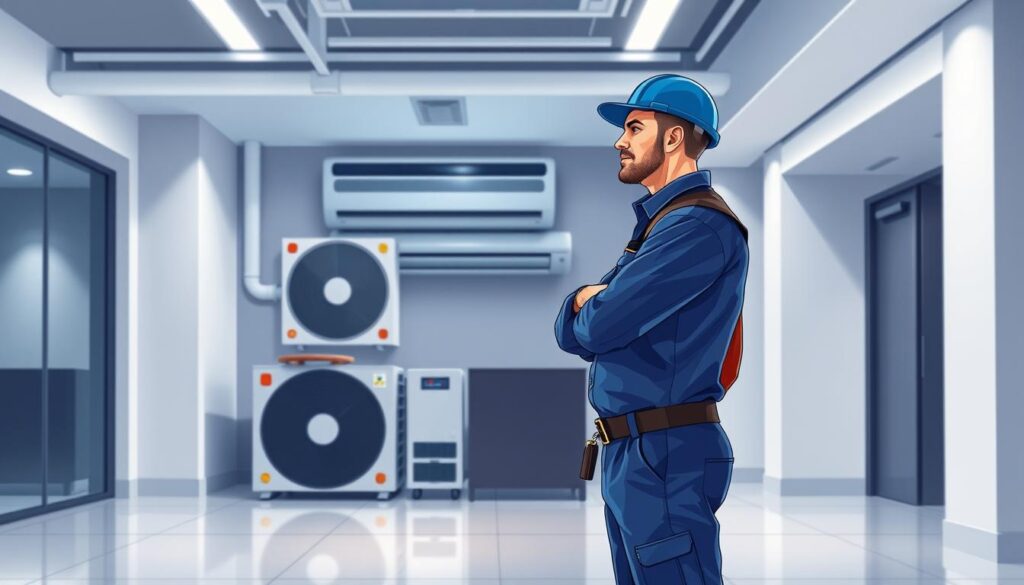Affiliate Disclosure
HVAC Guide Guys is a participant in the Amazon Services LLC Associates Program, an affiliate advertising program designed to provide a means for sites to earn advertising fees by advertising and linking to Amazon.
How Much Do HVAC Employees Make? Ever wondered how much people earn fixing our air conditioning and heating? Learning about HVAC salaries can open doors to great careers. These jobs are key to keeping us comfortable.

The HVAC field has good pay for skilled workers across the U.S. In 2020, the median salary for HVAC techs was $48,730. Your salary can grow with experience, specialization, and where you work.
How much you earn in HVAC depends on your skills, certifications, and the job you pick. This guide will help you understand HVAC pay. It’s perfect for beginners or those looking to move up in their careers.
Key Takeaways
- Median HVAC technician salary stands at $48,730 annually
- Earnings vary by experience, location, and specialization
- Career growth is strong in the HVAC industry
- Certifications can greatly increase your earnings
- Commercial and residential jobs have different pay levels
Table of Contents
How Much Do HVAC Employees Make
The HVAC industry offers promising career opportunities with competitive compensation across different experience levels. Understanding hvac technician income can help you plan your professional journey and set realistic salary expectations.
HVAC workers can expect significant salary growth as they gain experience and develop specialized skills. Your earning depends on education, certifications, and job complexity.
Entry-Level HVAC Salaries
Starting your career as an HVAC installer, you can expect entry-level wages. These wages reflect your foundational skills. Typical hvac worker compensation for newcomers ranges between $35,000 and $45,000 annually.
- Median starting salary: $42,500
- Hourly wage range: $16-$22
- Training and apprenticeship opportunities
Mid-Career HVAC Earnings
With 2-4 years of experience, your hvac installer wages will increase. Mid-career technicians typically earn between $55,000 and $70,000 per year.
- Advanced technical skills development
- Increased job responsibilities
- Potential for specialization
Senior-Level HVAC Compensation
Experienced HVAC professionals with 4-7 years in the field can command impressive salaries. Senior technicians often earn between $70,000 and $90,000 annually.
- Expert-level technical knowledge
- Complex system installations
- Leadership and mentoring opportunities
Explore Our HVAC Shop
Looking for top-rated HVAC tools, parts, and accessories? Visit our shop and find the perfect solution for your needs.
Visit the ShopTop-Paying States for HVAC Technicians
Location is key when it comes to HVAC technician pay. Some states pay more than others.
California is at the top, with HVAC techs earning the most. The state’s unique climate and tech needs create high demand. New Jersey and Washington also offer great pay.
- California: Highest average salary at $59,200
- New Jersey: Strong regional compensation at $58,300
- Washington: Competitive pay scale at $58,000
What makes these salaries high? It’s the cost of living, local economy, HVAC system complexity, and climate.
- Cost of living in metropolitan areas
- Local economic conditions
- Complexity of HVAC systems
- Regional climate variations
Your salary can change a lot based on where you work. Choosing the right location can really boost your income.
“Location is everything in the HVAC industry” – Professional HVAC Recruiters Association
Big cities usually have better pay. Places like San Francisco, New York, and Seattle offer great salaries for HVAC pros. They face complex tech challenges.
Experience Levels and Salary Growth
Your HVAC career is a journey of growth and increasing income. As you gain experience and skills, your income will rise.
Knowing how your income will grow helps you plan your career. Let’s look at how experience leads to better pay.
Career Progression Timeline
The HVAC industry has a clear path for advancement. Your earnings will grow as you move up:
- Entry-level (0-2 years): $35,000 – $45,000
- Mid-career (3-5 years): $50,000 – $65,000
- Experienced technician (6-10 years): $65,000 – $80,000
- Senior technician (10+ years): $80,000 – $95,000
Skill Development Impact
Investing in your skills boosts your income. Specialized certifications and advanced training increase your value and open better-paying jobs.
“Continuous learning is the key to unlocking higher earnings in the HVAC industry.” – Industry Expert
Management Position Earnings
Getting into supervisory or management roles raises your income. HVAC supervisors with 7+ years of experience earn a median of $90,800 nationally. This shows the big financial rewards of moving up in your career.
Your dedication to growing professionally and improving your skills will drive your long-term financial success in HVAC.
Explore Our HVAC Shop
Looking for top-rated HVAC tools, parts, and accessories? Visit our shop and find the perfect solution for your needs.
Visit the ShopRegional Salary Variations by City
Your HVAC trade salaries can change a lot based on where you work. Cities offer different pay and benefits. These vary with local economy, demand for skills, and living costs.
Some cities pay HVAC pros more than others. San Francisco tops the list with entry-level salaries at $64,200. New York City is close behind at $60,600. These cities offer big financial rewards for skilled workers.
- San Francisco: $64,200 average entry-level salary
- New York City: $60,600 average entry-level salary
- Newark: $59,900 average entry-level salary
- Seattle: $59,200 average entry-level salary
- Bridgeport, CT: $58,800 average entry-level salary
Urban areas usually pay more than rural ones. Several things affect these differences:
- Local infrastructure development
- Climate and seasonal demand
- Population density
- Economic growth
- Construction industry activity
Think about local market conditions when planning your HVAC career. Location can greatly affect your earnings. Cities by the coast and in tech hubs often have better pay for skilled workers.
Commercial vs Residential HVAC Salaries
When looking into HVAC salaries, it’s key to know the difference between commercial and residential jobs. The HVAC field offers many chances to earn, with pay varying based on the job setting.
HVAC technician pay changes a lot between commercial and residential jobs. Each area has its own challenges and money-making chances that can shape your career.
Commercial Sector Earnings Breakdown
Commercial HVAC workers usually make more money because of the big systems they work on. Your pay can go up with skills in:
- Industrial refrigeration systems
- Complex climate control mechanisms
- Advanced building automation technologies
Residential Service Income
Residential HVAC jobs offer steady pay with chances to grow. They might not pay as much as commercial jobs, but residential techs get:
- More regular hours
- Direct contact with customers
- More chances for repeat business
Specialized System Compensation
Experts in certain HVAC systems can earn a lot more. Skills in geothermal heating or smart home climate control can lead to higher pay and make you stand out.
Investing in specialized training can dramatically increase your market value and income.
Education and Certification Impact on Earnings

Starting your HVAC career can really boost your earnings. Getting the right education and certifications is key. It’s a smart way to increase your income.
Certifications are very important for making more money. The top certifications in HVAC are:
- EPA 608 Certification – Needed for working with refrigerants
- NATE (North American Technician Excellence) Certification
- HVAC Excellence Professional Level Certification
- R-410A Certification for newer cooling systems
Going to school can change your career for the better. Associate degrees and vocational training give you skills that employers want.
“Continuous learning is the minimum requirement for success in the HVAC industry.” – HVAC Industry Expert
See how education can raise your salary:
| Education Level | Average Annual Earnings | Potential Increase |
|---|---|---|
| High School Diploma | $42,000 | Baseline |
| Associate Degree | $52,000 | 24% Increase |
| NATE Certification | $58,000 | 38% Increase |
Getting specific certifications can lead to better-paying jobs. Your dedication to learning will pay off in your career.
Explore Our HVAC Shop
Looking for top-rated HVAC tools, parts, and accessories? Visit our shop and find the perfect solution for your needs.
Visit the ShopBenefits and Additional Compensation
Exploring hvac careers earnings means looking at the whole compensation package. HVAC pros get more than just a salary. They get benefits that make these jobs very appealing.
Top HVAC employers know that good pay is important. They offer extra benefits to keep skilled workers happy. These perks make hvac jobs even more valuable.
Health Insurance Packages
Most HVAC companies give great health insurance. It includes:
- Medical coverage with many plan options
- Dental and vision insurance
- Prescription drug coverage
- Preventative care benefits
Retirement Plans
Retirement planning is key in HVAC jobs. Many employers offer:
- 401(k) matching programs
- Pension plans for long-term workers
- Investment and retirement advice
Performance Bonuses
Technicians can earn more with bonuses. These include:
- Quarterly performance incentives
- Customer satisfaction bonuses
- Referral rewards
- Annual productivity pay
Knowing about these extra pay elements helps you see the full financial picture of HVAC careers.
Industry Growth and Salary Trends

The HVAC industry is changing fast, opening up great opportunities for those looking for good jobs. The Bureau of Labor Statistics says HVAC careers will keep growing, with more jobs available.
Several things are making the industry grow:
- More focus on energy-saving tech
- More people using smart home systems
- More efforts to protect the environment
- Upgrades to old buildings
These changes can really help your career in HVAC. New tech is creating special jobs that pay well.
“The future of HVAC is not just about temperature control, but intelligent, sustainable solutions.” – HVAC Industry Expert
New tech like IoT and green energy is changing the industry. If you keep learning new skills, you’ll be ready for these changes.
| Industry Growth Indicator | Projected Impact |
|---|---|
| Job Market Expansion | 5-7% annual growth |
| Technological Innovation | Increased specialization opportunities |
| Sustainable Design Demand | Higher compensation for green skills |
Staying ahead of industry trends will be key to making more money in HVAC.
Explore Our HVAC Shop
Looking for top-rated HVAC tools, parts, and accessories? Visit our shop and find the perfect solution for your needs.
Visit the ShopCareer Advancement and Income
Boosting your career in HVAC can really pay off. Skilled technicians have many ways to grow their income. Planning your career is key to earning more in this fast-paced field.
There are several paths to higher earnings:
- Pursue specialized certifications in advanced HVAC systems
- Develop expertise in commercial HVAC installations
- Consider management leadership roles
- Explore entrepreneurship by starting your own HVAC business
Knowing how much HVAC workers make is important. Specializing can greatly increase your income. For example, moving from residential to commercial HVAC can raise your earnings by 20-30% each year.
Key strategies for career advancement include:
- Obtain advanced technical certifications
- Build a robust professional network
- Stay updated with emerging HVAC technologies
- Develop strong customer service skills
Management roles are also very rewarding. Experienced HVAC pros can move up to service managers, operations directors, or technical supervisors. These jobs often come with higher pay than starting positions.
Investing in your professional development is the most reliable way to increase your HVAC trade salaries.
Conclusion
The HVAC industry offers great opportunities for those looking for stable and rewarding careers. As an HVAC technician, you can earn from $54,100 at the start to $90,800 in supervisory roles. This depends on several factors like location, expertise, and specialization.
It’s important to understand hvac salaries to plan your career. Your earnings will grow with skills, certifications, and career moves. Getting specialized in commercial systems or energy-efficient tech can really increase your income.
Location is key when it comes to salary. Places like California, New York, and Texas offer high pay for skilled HVAC techs. By investing in education, gaining experience, and staying up-to-date with tech, you can succeed in this field.
Your HVAC career is a chance for big financial growth. With the industry growing and more demand for skilled techs, now is a great time to improve your skills and earnings.
